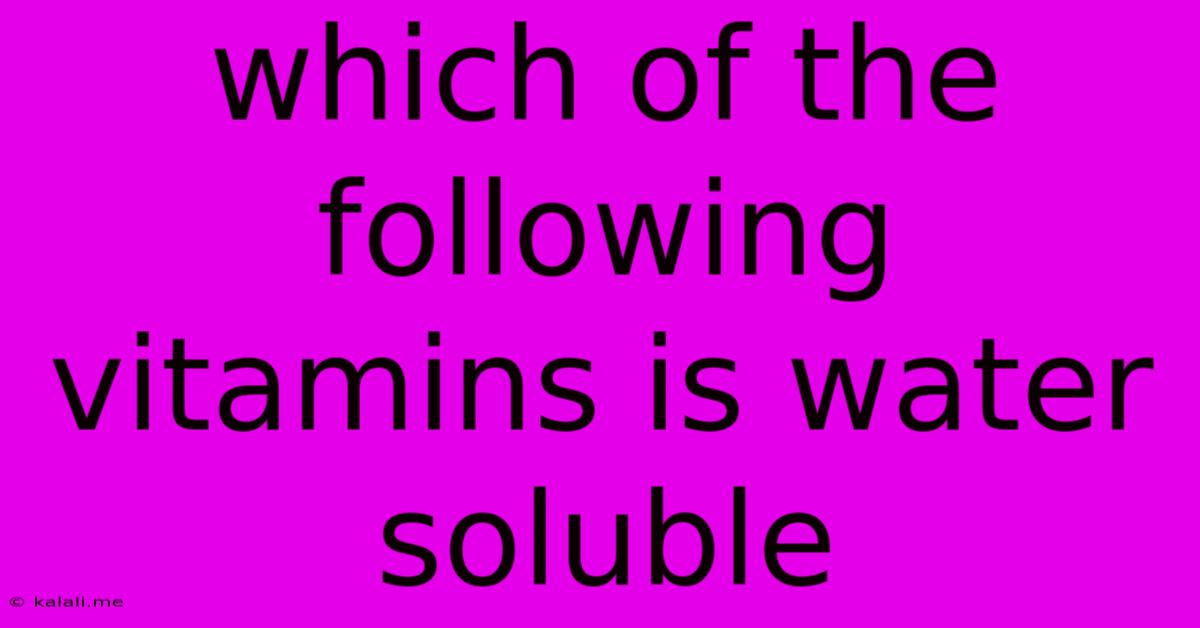Which Of The Following Vitamins Is Water Soluble
Kalali
Jun 12, 2025 · 3 min read

Table of Contents
Which Vitamins Are Water-Soluble? A Comprehensive Guide
Meta Description: Discover which vitamins your body can't store and need regular replenishment from your diet. Learn about the crucial roles of water-soluble vitamins and how to ensure you're getting enough. This guide covers B vitamins and vitamin C in detail.
Water-soluble vitamins are essential nutrients that dissolve in water. Unlike fat-soluble vitamins (A, D, E, and K), which your body can store in fat tissues, water-soluble vitamins aren't stored to any significant extent. This means you need to consume them regularly through your diet to maintain adequate levels. Excess water-soluble vitamins are typically excreted in urine, minimizing the risk of toxicity from overconsumption.
There are two main groups of water-soluble vitamins: B vitamins and vitamin C. Let's explore each group in more detail.
Understanding the B Vitamins: A Family of Essential Nutrients
The B vitamins are a group of eight vitamins that play a crucial role in numerous bodily functions, including energy production, cell metabolism, and nerve function. They are often found together in many foods and work synergistically. Here’s a brief overview of each:
-
Thiamin (B1): Essential for carbohydrate metabolism and nerve function. Deficiency can lead to beriberi. Good sources include pork, legumes, and whole grains.
-
Riboflavin (B2): Plays a key role in energy production and maintaining healthy skin and eyes. Deficiency can cause cheilosis (cracked lips) and glossitis (inflammation of the tongue). Milk, yogurt, and leafy green vegetables are good sources.
-
Niacin (B3): Important for energy metabolism and DNA repair. Pellagra, a deficiency disease, can cause skin lesions, diarrhea, and dementia. Meat, poultry, and fish are excellent sources.
-
Pantothenic Acid (B5): Involved in the synthesis of hormones and cholesterol. Deficiency is rare. Widely distributed in many foods.
-
Pyridoxine (B6): Crucial for protein metabolism, red blood cell formation, and brain development. Deficiency can lead to anemia and neurological problems. Bananas, chickpeas, and tuna are good sources.
-
Biotin (B7): Plays a role in cell growth and metabolism. Deficiency is rare. Eggs, nuts, and seeds are good sources.
-
Folate (B9): Essential for DNA synthesis and cell division. Crucial for pregnant women to prevent neural tube defects in developing fetuses. Leafy green vegetables, citrus fruits, and legumes are rich in folate.
-
Cobalamin (B12): Important for nerve function, red blood cell formation, and DNA synthesis. Primarily found in animal products, making it important for vegetarians and vegans to supplement.
Vitamin C: The Antioxidant Powerhouse
Vitamin C, also known as ascorbic acid, is a potent antioxidant that protects cells from damage caused by free radicals. It plays a role in collagen synthesis (important for skin and connective tissues), iron absorption, and immune function. Scurvy, a deficiency disease, is characterized by bleeding gums, fatigue, and easy bruising. Citrus fruits, berries, and bell peppers are excellent sources of vitamin C.
Ensuring Adequate Intake of Water-Soluble Vitamins
While toxicity from water-soluble vitamins is less of a concern than with fat-soluble vitamins, obtaining a balanced diet rich in fruits, vegetables, and whole grains is the best approach to ensure adequate intake. Supplementation may be considered in specific cases, such as pregnancy, vegan/vegetarian diets (B12), or diagnosed deficiencies, but should always be discussed with a healthcare professional. They can assess your individual needs and help you determine the appropriate course of action. Remember, a healthy and varied diet is the cornerstone of optimal health and vitamin intake.
Latest Posts
Latest Posts
-
32 Is 80 Of What Number
Jun 13, 2025
-
The P In Dpt Stands For
Jun 13, 2025
-
Deductive Reasoning Test With Answers Pdf
Jun 13, 2025
-
Which Of The Following Is Not Another Term For Cryptocurrency
Jun 13, 2025
-
Which Of The Following Is A Barrier To Effective Communication
Jun 13, 2025
Related Post
Thank you for visiting our website which covers about Which Of The Following Vitamins Is Water Soluble . We hope the information provided has been useful to you. Feel free to contact us if you have any questions or need further assistance. See you next time and don't miss to bookmark.